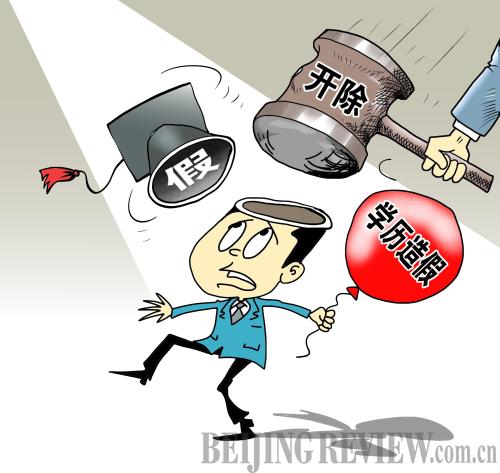|
 |
|
FRAUDULENT ACHIEVEMENTS (CFP) |
Thomas Edison once said, "Genius is 1 percent inspiration and 99 percent perspiration." Yet not all prospective geniuses like to sweat, so they look for shortcuts.
Lu Jun, previously a professor at Beijing University of Chemical Technology (BUCT), was recently found to have taken a shortcut of his own.
On June 27, Fang Shimin, a famous debunker of academic fraud known by his pen name Fang Zhouzi, blogged that netizens found that Lu took credit for seven high-level academic papers written by another person.
In his online resume, Lu listed seven papers as his key publications. The seven papers were all published in prestigious overseas academic journals, including two in Nature. Fang said that a person with such impressive publication record should be able to work for the best universities in the world.
Indeed, it was found that the real author of these papers works as an assistant professor at Yale University whose name coincidentally shares the same Chinese pinyin spelling as the Lu at BUCT.
"Those seven publications listed on his website were indeed my work. The two of us are not the same person. Our Chinese names are spelled the same but are of different characters," reads an e-mail from the Yale assistant professor posted on Fang's blog.
Lu, 39, was hired as a professor by BUCT in November 2011. In March, he was invited into China's 1,000 Young Talents Program. The program aims to attract top-notch scientists and scholars from overseas to work in China. Researchers selected into the program receive large grants and other benefits from the government, including a lump-sum award of 500,000 yuan ($78,587).
Fang also suspected that Lu's doctoral degree from University of Toronto in Canada and his work experience in an American company were also fraudulent. "Lu might have put under his name the doctoral degree, work experience and publications of three different persons by the same name, which is too creative," Fang said.
On the same day that Fang exposed Lu's dishonesty on his blog, the government office managing the 1,000 Young Talents Program announced that Lu was disqualified from the program. Lu was also sacked by BUCT.
Fang, with a doctoral degree in biochemistry from Michigan State University, has made a name for himself for exposing academic fraud in China. In recent years, he has exposed a few cases of academic fraud committed by overseas returnees.
In July, Fang revealed that Fu Jin, a former medical professor at Xiamen University in southeastern Fujian Province, forged her doctoral degree diploma from Columbia University in the United States. Fu was recruited from overseas under Minjiang Scholars Program, an overseas talent recruiting program in Fujian. The scandal led to Fu's dismissal from Xiamen University.
Nearly one year ago, on September 4, 2011, Fang disclosed that Wang Zhiguo, then a professor at Harbin Medical University in northeastern Heilongjiang Province and a researcher with the Montreal Heart Institute (MHI) Research Centre in Canada, was fired for scientific misconduct.
According to the institute, Wang's publications were retracted from two scientific journals. After an investigation, an expert committee concluded that Wang had deviated from ethical standards of proper scientific conduct. His privileges and status as a researcher were revoked and his laboratory was closed. The institute also requested the retraction of three additional scientific articles claimed by Wang.
Before his publications were retracted, Wang had been selected by China's 1,000 Talent Program. After the scandal, Wang was removed from the program, according to Fang.
In 2006, Fang exposed then-Tsinghua University professor Liu Hui for taking credit for a paper published by a researcher named Liu Hong. The former Tsinghua professor was hired for his research and work experience in the United States. After three months of investigation, Tsinghua fired Liu.
| 